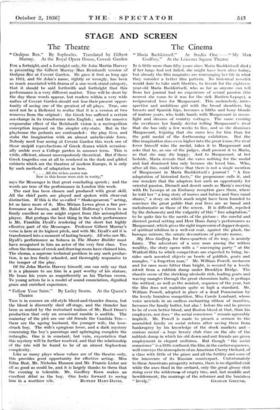The Cinema
" Maria Bashkirtseff." At Studio One— My Man Godfrey." At the Leicester Square Theatre IT is little more than fifty years since Maria Bashkirtseff died ; if her lungs had not failed, she might have been alive today, but already the film magnates are rearranging her life in what they consider a better film pattern. No historical novelist would dare to take such liberties, to invent for the eighteen- year-old Maria Bashkirtseff, who as far as anyone can tell from her journal had no experience of sexual passion (the nearest she came to it was for the sick Bastien-Lepage), a reciprocated love for Maupassant. This melancholy, intro- spective and ambitious girl with the broad shoulders, big breasts and Spanish hips, becomes a blithe and bony blonde of mature years, who holds hands with Maupassant in moon- light and dreams of country cottages. The same evening she overhears her family doctor telling Maupassant's rival that she has only a few weeks to live, and so she dismisses Maupassant, feigning that she cares less for him than for the gold medal of the forthcoming exhibition. But the film imagination rises even higher into the great inane, the rival lover himself wins the medal, takes it to Maupassant and asks that he, as one of the judges, shall present it to Maria, so that she may die happy. And to Maupassant, at her bedside, Maria reveals that she cares nothing for the medal and had dismissed him only because she loved him. Who, after all this, could believe that there is not a single mention of Maupassant in Maria Bashkirtsefi's journal ? " A free adaptation of historical facts," the programme calls it, and one wonders that the adapters lost such an opportunity for oriental passion, Disraeli and desert sands as Maria's meeting with De Lesseps at an Embassy reception gave them, where he told her " a long story of nurses and babies and Suez canal shares," a story on which much might have been founded to convince the great public that real lives arc as banal and melodramatic as those of the screen. It is difficult, repelled by the dishonesty and the vulgarity of this "free adaptation," to be quite fair to the merits of the picture : the careful and discreet period setting and Herr Hans Jaray's performance as Maupassant, which gives the right impression of dapper despair, of spiritual nihilism in a well-cut coat, against the plush, the baroque mirrors, the ornate decorations of private rooms.
My Man Godfrey, for three-quarters of its way, is acutely funny. The adventure of a sane man among the witless wealthy, the story opens with a " scavenging party " at the Waldorf-Ritz to which competitors are expected to bring, be- sides such assorted objects as bowls of goldfish, goats and mangles, " a forgotten man." Mr. William Powell, unshaven and for once more bitter than bright, is secured by a lovely nitwit from a rubbish dump under Brooklyn Bridge. The chaotic scene of the shrieking alcoholic rich, leading goats and waving mangles through the great chromium halls, is perhaps the wittiest, as well as the noisiest, sequence of the year, but the film does not maintain quite so high a standard. Mr. William Powell, adopted in place of a dead Pomeranian by the lovely brainless competitor, Miss Carole Lombard, whose voice unwinds in an endless enchanting ribbon of inanities, becomes the family butler, but alas ! before the end lie proves to be of even better blood, and Boston blood at that, than his employers, nor does " the social conscience " remain agreeably implicit. Mr. Powell is made to preach a sermon to the assembled family on social reform after saving them from bankruptcy by his knowledge of the stock markets and— curious moral—a huge luxury club rises on the site of the rubbish dump in which his old down-and-out friends are given employment in elegant uniforms. But though " the social conscience" is a little confused,the film, in the earlier sequences, well conveys the atmosphere of an American Cherry Orchard, of a class with little of the grace and all the futility and some of the innocence of its Russian counterpart. Unfortunately to these Americans prosperity returns, there is no dignified exit while the axes thud in the orchard, only the great glossy club rising over the wilderness of empty tins, and, last muddle and bewildermeat, the marriage of the refOrnier and the brainless










































 Previous page
Previous page